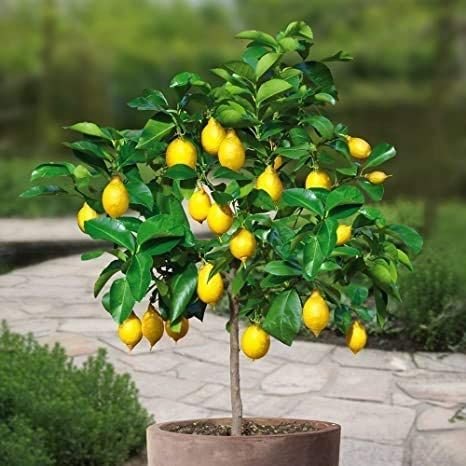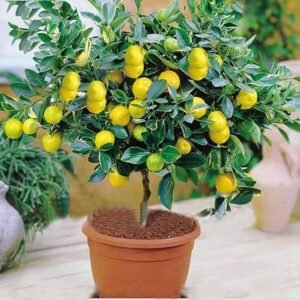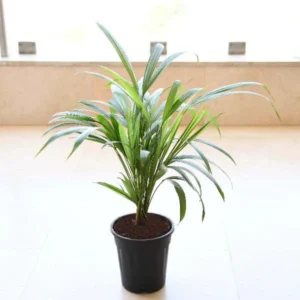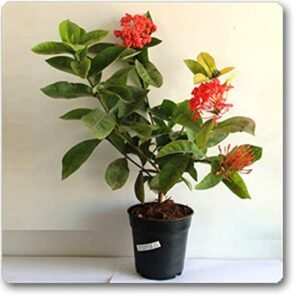Description
The Nimbu Plant (Lemon Plant): A Complete Description
The Nimbu plant, commonly known as the lemon plant, is one of the most widely cultivated and useful citrus plants in the world. Known scientifically as Citrus limon, it belongs to the Rutaceae family. In India and many other parts of South Asia, it is affectionately called “Nimbu” in Hindi and regional languages. This plant is not only valued for its tangy, vitamin-rich fruit but also for its medicinal, culinary, and cultural significance.
Botanical Profile
- Scientific name: Citrus limon
- Common names: Lemon, Nimbu, Limbu, Citronnier (French)
- Family: Rutaceae
- Origin: Thought to have originated in northeastern India, northern Myanmar, or China
- Type: Evergreen shrub or small tree
- Average height: 10–20 feet (3–6 meters)
Physical Characteristics
The Nimbu plant is an evergreen, thorny shrub or small tree. It typically grows to a height of 10 to 20 feet and has a rounded or spreading canopy. The branches often bear sharp thorns. The leaves are elliptical or ovate, bright green, and aromatic due to the presence of essential oils.
The plant produces fragrant white flowers with five petals, which are sometimes tinged with purple. These blossoms are not only beautiful but also crucial for pollination and fruit production. After pollination, the flowers give rise to the familiar lemon fruit.
The lemon itself is usually oval or round, with a bright yellow, textured rind. The inner flesh is segmented and juicy, with a distinctly sour taste. Some varieties may contain seeds, while others are seedless.
Climate and Soil Requirements
The Nimbu plant thrives in tropical and subtropical climates. It requires:
- Sunlight: Full sun exposure for at least 6–8 hours a day
- Temperature: Optimal growth between 20°C to 35°C (68°F to 95°F)
- Soil: Well-drained, loamy soil rich in organic matter; pH between 5.5 and 7
- Watering: Regular watering is necessary, especially during dry spells, but overwatering must be avoided to prevent root rot
It can tolerate light frost but is sensitive to extreme cold. In colder regions, it is often grown in containers and brought indoors during winter.
Cultivation and Care
Nimbu plants can be grown from seeds, cuttings, or grafted saplings. Grafted plants tend to bear fruit faster and are often preferred by gardeners and farmers.
Key practices include:
- Pruning: Helps shape the tree, remove dead or diseased wood, and improve air circulation
- Fertilization: Requires regular feeding with nitrogen-rich fertilizers and micronutrients like zinc and magnesium
- Pest management: Common pests include aphids, leaf miners, and citrus psyllids. Natural remedies or organic pesticides can help control them
- Mulching: Conserves moisture and suppresses weeds
Proper care and management result in a healthy plant that produces fruit year-round, especially during the warmer months.
Varieties of Nimbu
Several varieties of lemon are grown across the world and in India. Some popular ones include:
- Eureka: Common in the U.S.; fruits year-round
- Lisbon: Similar to Eureka but more tolerant to heat
- Kagzi Nimbu: Popular Indian variety with thin skin and juicy pulp
- Meyer lemon: A hybrid between lemon and orange, known for its mild flavor and small size
Each variety has its own advantages depending on the local climate and soil conditions.
Nutritional and Health Benefits
Lemons are a nutritional powerhouse, rich in:
- Vitamin C: Boosts immunity, improves skin health
- Citric acid: Helps in digestion and kidney stone prevention
- Flavonoids: Antioxidants with anti-inflammatory properties
- Potassium and calcium: Essential minerals for heart and bone health
Drinking lemon water is a popular home remedy for detoxification, digestion, and weight loss. Lemon juice is also used in traditional medicine to treat sore throat, indigestion, and skin issues.
Culinary Uses
The Nimbu plant is a staple in many cuisines around the world. Both the juice and zest (peel) of the lemon are widely used:
- In beverages like lemonade, nimbu pani, and teas
- As a seasoning in curries, soups, salads, and marinades
- For baking and desserts like lemon cake, lemon bars, and tarts
- In pickles and chutneys in Indian cuisine
Its tangy, refreshing taste enhances the flavor of many dishes and balances rich or spicy foods.
Medicinal and Traditional Uses
The lemon has been used in Ayurveda, Unani, and folk medicine for centuries. Its juice, peel, and leaves are all used in traditional remedies.
- Lemon juice mixed with honey is a common remedy for sore throats and coughs.
- Lemon oil is used in aromatherapy to relieve stress and improve mood.
- Lemon peel is sometimes dried and used in herbal teas or powders for digestion.
The leaves of the Nimbu plant are also aromatic and sometimes used in herbal infusions or placed in homes for their fresh fragrance and insect-repellent properties.
Cultural Significance
In Indian culture, the Nimbu plant and fruit hold symbolic and ritualistic value:
- Lemons are often hung with green chilies at the entrance of shops or homes to ward off the evil eye.
- In some rituals, lemons are used as offerings to deities or during cleansing ceremonies.
- During festivals, lemon juice may be part of purification rites or traditional foods.
These beliefs, while rooted in tradition, reflect the importance of the plant beyond just its practical uses.
Commercial Importance
Lemon cultivation is a significant agricultural industry. India is one of the largest producers of lemons in the world. Lemons are sold fresh or processed into:
- Lemon juice concentrate
- Citric acid
- Lemon oil
- Pickles and preserves
The essential oils from the peel are used in perfumes, soaps, and cleaning agents due to their refreshing scent and antibacterial properties.
Environmental and Aesthetic Benefits
Aside from its economic and nutritional value, the Nimbu plant also has ecological and ornamental benefits:
- Its dense foliage provides shade and shelter for birds and insects.
- As a container plant, it adds beauty to gardens, balconies, and patios.
- The fragrant flowers attract pollinators like bees and butterflies.
Conclusion
The Nimbu plant is more than just a fruit-bearing tree. It is a symbol of health, flavor, and tradition. From ancient herbal remedies to modern kitchens, from small gardens to vast orchards, the lemon plant continues to play a vital role in human life. Its versatility, ease of cultivation, and wide range of uses make it a cherished plant across cultures and continents. Whether it is a glass of refreshing lemonade on a hot day or the zesty flavor in your favorite dish, the humble Nimbu adds zest and vitality to our lives.






 Buxus Bonsai - Plant
Buxus Bonsai - Plant  NIMBU-PLANT
NIMBU-PLANT  Areca Palm (Small) - Plant
Areca Palm (Small) - Plant  HAVELIYA-PLANT
HAVELIYA-PLANT 

Reviews
There are no reviews yet.